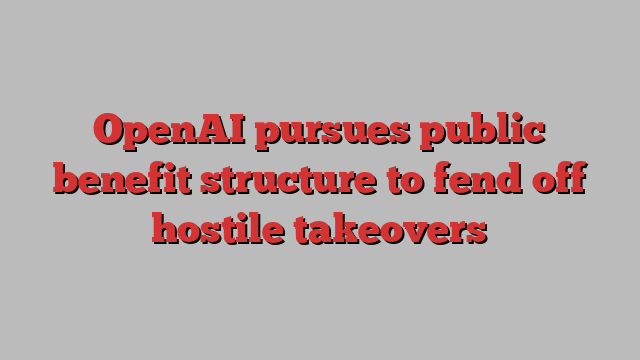
Unlock the Editor’s Digest for free
Roula Khalaf, Editor of the FT, selects her favourite stories in this weekly newsletter.
OpenAI is pursuing a largely untested corporate structure to defend itself from hostile takeovers and protect chief executive Sam Altman from outsider interference.
The artificial intelligence start-up, which last week secured $6.6bn in new funding, is planning to restructure as a public benefit corporation, a new and rare type of company model also adopted by AI rivals including Anthropic and Elon Musk’s xAI.
A key benefit of this PBC structure is its potential to thwart an unwanted acquisition or an activist’s demands, according to multiple people familiar with the company’s thinking. This means an existing investor such as Microsoft or another party could be frustrated if they mounted an effort to acquire OpenAI.
OpenAI’s PBC business would be obliged to balance the best interests of shareholders, a public benefit, and stakeholders, such as employees and society.
This “multipronged approach to fiduciary obligations” for a company would give OpenAI a “safe harbour” to wave off activists who might claim the company is not making enough money, according to one person.
It “gives you even more flexibility to say ‘thanks for calling and have a nice day’,” they added.
The proposed changes come in a tumultuous period for the fast-growing group, which is now one of Silicon Valley’s most valuable companies after completing its latest fundraising at a $150bn valuation.
Its new structure will allow it to continue to attract investors and gain the capital it needs to take on well-funded rivals such as Google, and afford the costs associated with building powerful AI models.
However, the company has suffered growing pains. Altman was briefly ousted in a boardroom coup a year ago. Several senior staff including its influential chief technology officer Mira Murati have announced their departures in recent weeks.
Meanwhile, Musk, who co-founded and helped finance OpenAI in 2015, is suing the company for allegedly abandoning its original mission of benefiting humanity when agreeing a multibillion-dollar partnership with Microsoft.
As part of the proposed restructure, the ChatGPT maker will retain a not-for-profit entity, which would be independent and have a stake in the PBC. This not-for-profit would have access to research and technology but solely focus on pursuing OpenAI’s mission of benefiting humanity.
The not-for-profit would probably be run by a different executive to Altman, who would lead the PBC and focus on developing technology, building products and “everything that needs to be done to be commercially successful”, the person familiar to the company’s thinking said.
Those people close to AI’s thinking said decisions had not been made and were being discussed by the board, with any changes likely to take time.
“OpenAI wants to keep that societal licence, with both a mission and a duty, while creating cutting-edge technology,” one of these people said.
OpenAI said: “We remain focused on building AI that benefits everyone, and we are working with our board to ensure that we’re best positioned to succeed in our mission.” It added: “The non-profit is core to our mission and will continue to exist and thrive.”
The PBC model is relatively new. Delaware, where most companies are incorporated, only adopted PBC legislation in 2013 and then changed provisions in 2020 to make the structure more enticing. Of the thousands of publicly traded companies in the US, fewer than 20 are PBCs. They include Warby Parker, Black Rifle Coffee and Veeva Systems.
However, it has proved popular with AI companies. Both Anthropic, the maker of the Claude AI tool, and Musk’s xAI are PBCs. One person close to xAI said this meant its probability of being sued was reduced if it did not act in accordance with the shareholders’ interests.
The activism defence offered by the PBC model has been previously highlighted by other groups. Lemonade, an online insurance company, has said in regulatory filings that Delaware’s PBC structure “could potentially make it easier for a board to reject a hostile bid, even where the takeover would provide the greatest short-term financial yield to investors.”
The PBC model has not yet been seriously tested in court, nor has it faced the public scrutiny that has already buffeted AI.
Several US senators have raised concerns about what threat AI might impose on public safety and national security. If AI executives were called before Congress to testify about their businesses, the PBC model might give the firms a way to deflect criticism, according to experts.
Jens Dammann, a professor at the University of Texas School of Law, said PBC provided “more leeway” from a traditional company’s duty to shareholders to maximise their wealth.
“It is intentionally a way for incumbent management and directors to entrench themselves,” he said. “If you can convey the idea to people that you are a good enterprise, a morally safe enterprise and that comes with very little constraints, that has to be tempting to entrepreneurs.”